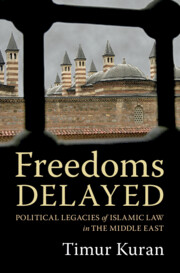Book contents
- Freedoms Delayed
- Freedoms Delayed
- Copyright page
- Dedication
- Contents
- Figures
- Tables
- Preface
- Part I The Modern Middle East’s Authoritarian Face
- Part II Persistent Social Atomization
- Part III Religious Repression
- 7 Religious Freedoms in Middle Eastern History
- 8 The Marginalization of Islam
- 9 The Resurgence of Assertive Islamism
- 10 Religious Diversification, in Fact and in Law
- 11 The Absence of Liberal Islamic Schisms
- Part IV Economic Hindrances
- Part V Conclusion
- Notes
- Bibliography
- Index
7 - Religious Freedoms in Middle Eastern History
from Part III - Religious Repression
Published online by Cambridge University Press: 20 July 2023
- Freedoms Delayed
- Freedoms Delayed
- Copyright page
- Dedication
- Contents
- Figures
- Tables
- Preface
- Part I The Modern Middle East’s Authoritarian Face
- Part II Persistent Social Atomization
- Part III Religious Repression
- 7 Religious Freedoms in Middle Eastern History
- 8 The Marginalization of Islam
- 9 The Resurgence of Assertive Islamism
- 10 Religious Diversification, in Fact and in Law
- 11 The Absence of Liberal Islamic Schisms
- Part IV Economic Hindrances
- Part V Conclusion
- Notes
- Bibliography
- Index
Summary
Although entry into Islam is costless, exit was banned early on. According to a widely accepted interpretation of early Islam, soon after Muhammad’s death a precedent for banning apostasy was set. In fact, the underlying dispute was over zakat, and the episode amounted to enforcing the tax code. But recasting this historical detail would not necessarily settle controversies over Muslim religious freedoms. Certain Quran verses speak of retribution against nonbelievers. Others preclude compulsion, arguably establishing a right to leave Islam. Insofar as a textual inconsistency exists – and that itself is debatable – for advocates of liberalizing Islam the challenge boils down to prioritizing liberal verses. Blasphemy and heresy charges, used repeatedly to persecute heterodox sects, also restrict sundry liberties. The fear of getting accused of religious offense constrains political discourse and inhibits collective action. But a broadening of Muslim religious freedoms through the liberalization of apostasy and blasphemy rules is not unthinkable. Analogous transformations have occurred in other religions. Besides, Islam has been reinterpreted repeatedly since its emergence, radically so in modern times. Innovations include Islamic banks, which are business corporations, and various Islamic NGOs, which are organized as nonprofit corporations. Evidently, no absolute barrier exists to broadening Islamic religious freedoms.
Keywords
- Type
- Chapter
- Information
- Freedoms DelayedPolitical Legacies of Islamic Law in the Middle East, pp. 111 - 132Publisher: Cambridge University PressPrint publication year: 2023

